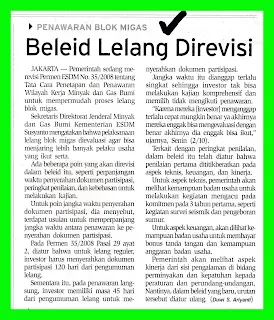The Ministry of Finance still formulates the upstream oil and gas investment tax scheme for the gross split system. The results are expected to benefit all parties.
"Our team is studying what is expected by them (investors). However, the most important, of course in addition to good results, the policy can run. It means exactly what is expected. For the government, give a good return as well, "said Finance Minister Sri Mulyani Indrawati.
The government is trying to encourage the growth of oil and gas investment. One of them through the updating of investment terms. Accordingly, the government issued Government Regulation (PP) Number 27 of 2017 on Amendment to Government Regulation Number 79 of 2010 on Refundable Operating Cost and Treatment of Income Tax in the Upstream Oil and Gas Business Field.
This rule applies to old investors who have been investing using product sharing contract (PSC), which is one of the components of cost recovery or the cost of recovery of contractor operations. As for potential investors who will enter the oil and gas sector in Indonesia, the government has set a gross split or share of oil and gas output based on gross production.
However, some articles of Government Regulation (PP) No 27/2017 are not suitable for that, relevant government regulations are being prepared, with one substance in the form of a tax scheme. From the policy side, Sri Mulyani said the taxation scheme of new rules is almost similar to the investment cost recovery regime. To that end, the government should have a handle on what fees can be a tax deduction.
"This is now being discussed with investors. Each has complications. Investors basically ask for no complexity. We are still looking to help reduce that complexity, "said Sri Mulyani.
Deputy Minister Kenangan Mardiasmo stated that in terms of exploration, the government's position is clear, namely the exemption of import duties, Income Tax (PPh), Import Value Added Tax (VAT), domestic VAT, as well as land and building tax (PBB).
As for the exploitation phase, the Ministry of Finance wants VAT and PBB to be imposed when contractors have made significant profits. While investors want the VAT and the UN released forever. While direct taxes, such as Income Tax, are automatically charged when the company already makes a profit, at a rate of 25 percent.
Target
At the Merdeka Palace yesterday, Sri Mulyani accompanied by Director General of Tax Ken Dwijugiasteadi met President Joko Widodo. Sri Mulyani, after meeting the President, said that in the meeting, among other things, it was said about tax revenue. Tax revenues until September 2017 are lower than the same period in 2016. Because, in September 2016, the tax forgiveness program has begun.
However, if the acceptance of this tax forgiveness program is not combined in September 2016 revenues, revenues until September 2017 are considered to be very good and increasing.
IN INDONESIA
Skema Pajak Investasi Masih Diformulasikan
Kementerian Keuangan masih memformulasikan skema pajak investasi hulu minyak dan gas bumi untuk sistem gross split. Hasilnya diharapkan bermanfaat bagi semua pihak.
”Tim kami sedang mempelajari yang diharapkan oleh mereka (investor). Namun, yang paling penting, tentu selain hasilnya baik, kebijakannya bisa berjalan. Artinya betul-betul sesuai dengan yang diharapkan. Bagi pemerintah, memberikan return yang baik juga,” kata Menteri Keuangan Sri Mulyani Indrawati.
Pemerintah berusaha mendorong pertumbuhan investasi minyak dan gas bumi (migas). Salah satunya melalui pemutakhiran ketentuan investasi. Sejalan dengan itu, pemerintah menerbitkan Peraturan Pemerintah (PP) Nomor 27 Tahun 2017 tentang Perubahan atas Peraturan Pemerintah Nomor 79 Tahun 2010 tentang Biaya Operasi yang Dapat Dikembalikan dan Perlakuan Pajak Penghasilan di Bidang Usaha Hulu Minyak dan Gas Bumi.
Aturan ini berlaku untuk investor lama yang selama ini berinvestasi menggunakan product sharing contract (PSC), yang salah satu komponennya berupa cost recovery atau biaya pemulihan operasi kontraktor. Sementara untuk calon investor yang akan masuk ke sektor migas di Indonesia, pemerintah telah menetapkan gross split atau pembagian hasil minyak dan gas berdasarkan produksi bruto.
Meski demikian, beberapa pasal pada Peraturan Pemerintah (PP) No 27/2017 tersebut tidak cocok untuk itu, peraturan pemerintah yang relevan sedang disiapkan, dengan salah satu substansi berupa skema pajak. Dari sisi kebijakan, Sri Mulyani mengatakan, skema perpajakan aturan baru hampir mirip dengan investasi rezim cost recovery. Untuk itu, pemerintah harus memiliki pegangan biaya apa saja yang bisa menjadi pengurang pajak.
”Ini yang sekarang sedang dibahas dengan investor. Masing-masing punya komplikasi. Investor pada dasarnya minta tidak kompleks. Kita masih melihat untuk membantu mengurangi kompleksitas tersebut,” kata Sri Mulyani.
Wakil Menteri Kenangan Mardiasmo menyatakan, dalam hal eksplorasi, posisi pemerintah sudah jelas, yakni membebaskan bea masuk, Pajak Penghasilan (PPh), Pajak Pertambahan Nilai (PPN) impor, PPN dalam negeri, serta pajak bumi dan bangunan (PBB).
Adapun untuk fase eksploitasi, Kementerian Keuangan menginginkan PPN dan PBB dikenakan ketika kontraktor sudah memperoleh keuntungan signifikan. Sementara investor menginginkan PPN dan PBB dibebaskan selamanya. Sementara pajak bersifat langsung, seperti PPh, secara otomatis dikenakan saat perusahaan sudah memperoleh keuntungan, dengan tarif 25 persen.
Target
Di Istana Merdeka, kemarin, Sri Mulyani didampingi Direktur Jenderal Pajak Ken Dwijugiasteadi menemui Presiden Joko Widodo. Sri Mulyani, seusai bertemu Presiden, mengatakan, dalam pertemuan itu antara lain disampaikan soal penerimaan pajak. Penerimaan pajak sampai September 2017 memang lebih rendah ketimbang periode yang sama di 2016. Sebab, pada September 2016, program pengampunan pajak sudah dimulai.
Namun, jika penerimaan dari program pengampunan pajak ini tidak digabungkan dalam penerimaan September 2016, penerimaan sampai dengan September 2017 dinilai masih sangat baik dan meningkat.
Kompas, Page-18, Wednesday, October 4, 2017









